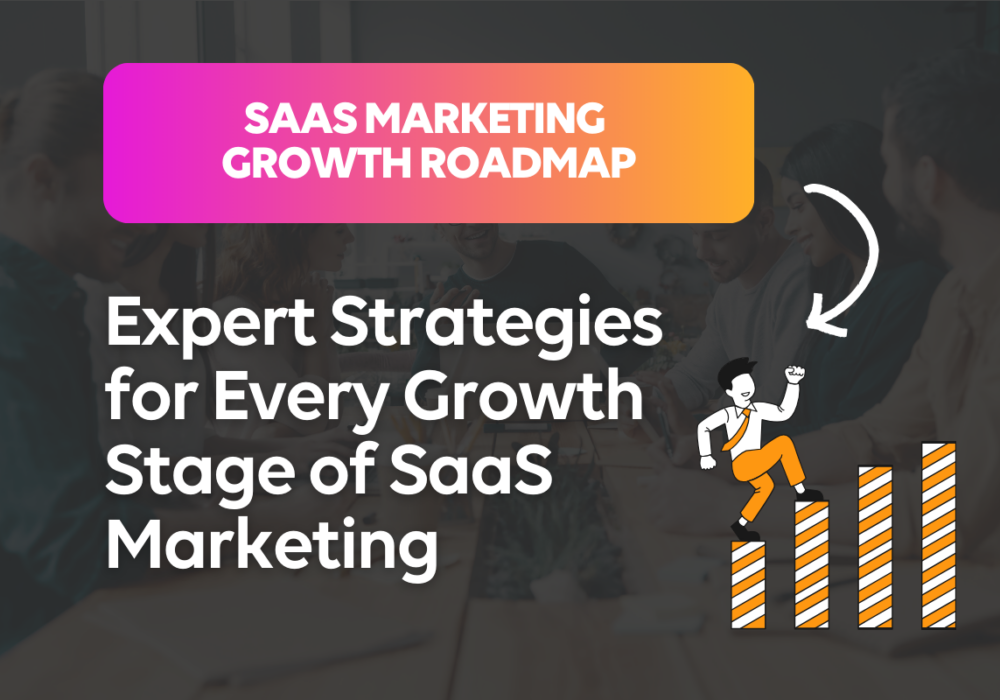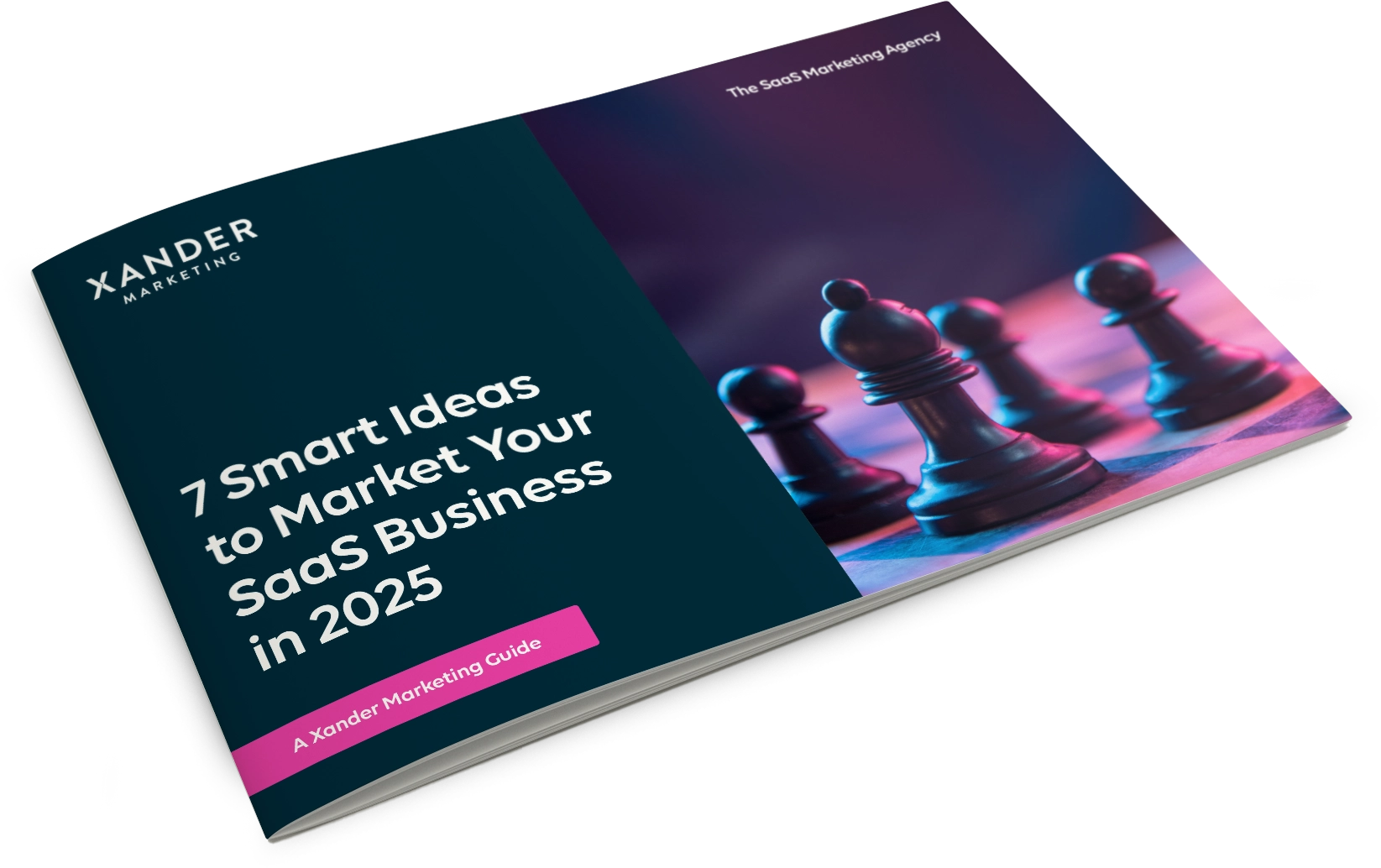How to Market your SaaS Product to Enterprise Customers
16th November 2022

Marketing your SaaS product to enterprises is tough. There are long sales cycles to work through, lots of stakeholders to engage with and a lengthy procurement process.
However, the rewards at the end of the tunnel include higher ACVs, long-term contracts and a great list of logos to use for social proof.
Read on to discover our top tips for selling your SaaS product to enormous yet often elusive enterprise brands.
SaaS Enterprise Marketing Challenges
Long sales cycles
One of the most significant challenges when it comes to enterprise-level marketing is the length of the SaaS enterprise sales cycle.
With enterprise-sized companies looking to make a significant investment in terms of money, time, and in many cases ‘change management’ investment, they typically choose to spend a long time deliberating over the right solution for their needs.
Multiple stakeholders will need to be consulted and convinced before a deal is signed, and even then it is typical for enterprises to choose a gradual rollout, piloting a product with one team or department before making a larger commitment.
Add to that the bureaucratic inertia of contract negotiations, procurement and RFPs, and you could be looking at a sales cycle of many months to years. Your sales and marketing needs to be prepared for the long haul, with a lead nurturing strategy that’s designed to develop a long-term relationship.
Multiple Buyers
The number of stakeholders involved in an enterprise-level buying decision not only increases the length of the sales cycle. It also complicates your approach.
Key decisions rarely come down to one individual in a large company. Stakeholders could range from senior directors to members of specific teams depending on your product. You will need to appeal to those likely to be using your product, as well as those footing the bill.
You’ll need to do your homework on each person involved in the sales cycle, and their roles within the business. Create specific and in-depth audience personas to work out the pain points and limitations that affect each person you’re likely to pitch to and personalise your content based on your findings.
Procurement
The procurement process exists to make sure that proper processes and company guidelines are adhered to. This process could begin early in your relationship with your prospect, with an RFP from their procurement team, or come in once your major stakeholders have given the green light.
This often-lengthy procedure introduces entirely new players, who need to understand different aspects of the deal before they let it go ahead. These negotiators need to make your product fit into a complex web of budgets, compliance guidelines and corporate rules.
You need to be prepared to get into the fine print, with a detailed breakdown of what the onboarding process is going to look like, when it will happen, how long it will take, and how costs will be spread out.
High costs
A longer sales cycle inevitably means increased marketing costs. You will need to build your financial model and strategic forecasts around these lengthy sales cycles, and account for the possibility of losses.
Your marketing team needs to create a range of personalised content for different stakeholders at different stages of the funnel, as well as supporting the sales team with collateral. You will need an extensive lead nurturing strategy in place that will last the length of the sales cycle.
You will also need to invest in automation, with tools such as HubSpot flagging up your sales team when prospects visit your website, prompting a relevant follow-up.
Components of an enterprise SaaS marketing strategy
Website
Enterprise-level customer journeys are far from linear. It’s not as simple as buyers searching for a solution, signing up for a free trial, and onboarding, with decision-makers more likely to return to your site multiple times throughout their process with different questions in mind.
Consider how your calls to action will differ during the length of your sales cycle. While you’re likely to make “book demo” a key conversion goal for your website, alternative CTAs such as downloading eBooks, registering webinars or using useful tools will give decision-makers more reason to return to your site and engage with your content.
Account-based marketing
When it comes to high-value accounts, Account Based Marketing (ABM) can be an invaluable part of your strategy. ABM is a growth strategy that combines the skills of both marketing and sales teams to create entirely personalised buying experiences for key accounts and stakeholders.
This approach will help you identify likely and lucrative prospects, and work around their specific needs. Research is critical here, with questions such as “who are the key buyers in this company?”, “what problem do they need to solve?”, “what solution are they currently using?” and “how is it falling short?” guiding your campaign.
This will allow you to create strongly personalised marketing via email, LinkedIn, blog content and more that addresses genuine pain points.
Once you’ve made contact with an enterprise company, your sales team will become responsible for building relationships and nurturing leads for the duration of the sales cycle. They need to offer an approachable touchpoint to specific stakeholders, understanding their specific needs and devising a personalised plan around them, backed up with collateral and support from marketing.
Content
Content should form the foundation of your personalised campaigns. Make sure there’s something new for your prospects to consider each time they come back to your site, and keep them fed with high quality content via social media and email marketing
Marketing needs to personalise their strategy not only to the different stakeholders involved, but to the different stages of the funnel that they’re at. For example, the awareness stage is a matter of lead generation, drawing people in and encouraging them to learn more. In the consideration stage, more in-depth content such as case studies and ROI calculators will help buyers evaluate your product’s value over competitors.
Thought leadership content such as eBooks, white papers and video guides come into their own at this level, offering high-level content which will keep decision-makers coming back to your site.
Consider investing in getting your name onto high-profile and trusted platforms such as Gartner and Forrester. This is often a considerable investment, but it pays off when it comes to reputation. Alternatively, look out for opportunities to appear in webinars with influential companies in your prospects’ industry.
By gating key content with a data capture form, you can also gain specific information about which decision-makers are engaging with your content. You can use this data to fine-tune your lead nurturing to these specific stakeholders, writing to their pain points and requirements.
Social proof is a particularly meaningful aspect of content creation when it comes to enterprise customers. By including big-name client logos on your homepage and social media, or writing in-depth case studies about them, you can prove to similarly-sized companies that your product is enterprise-ready.
PPC
PPC is still an important aspect of a good enterprise marketing strategy, allowing you to carefully tailor your advertising to specific audiences and pain points, making sure the right messaging gets in front of the right people.
Remarketing can be a key aspect of marketing to enterprises, encouraging buyers to revisit your site and learn more about your product, whilst keeping your brand front and centre. However, a one-size-fits-all approach isn’t always going to be effective here. Your remarketing campaign should be adaptive and personalised to different key decision makers at different stages of the funnel.
Social media
Social media success relies on a two-way conversation. In addition to your brand’s social groups and pages, you need to be reaching out directly to your prospects, sharing and commenting on their content, replying to their comments on yours, and keeping your social content up to date with tips and insights that they’ll find relevant.
Start by understanding your ideal customer profile including their social media usage, then design your social media presence around the channels they’re using and the content they’re engaging with.
This could mean expanding your channels to include specific industry-related communities in places like Reddit, Substack, Slack and Discord in order to join real conversations around the pain points particular to your ideal prospects.
These platforms allow you the opportunity to create genuine industry conversations around your content and increase your reputation as a thought leader in your industry.
Bring your Target Market Together
Much of your strategy will rely on passive digital communications, creating the content your prospects want to see and making sure it reaches them. However, bringing your prospective stakeholders together can be a powerful tactic when it comes to providing a human touch and creating lasting relationships.
This could be a matter of hosting a roundtable – either in person or online – where peers in your target market can discuss opportunities for advancement in your industry.
Don’t be afraid to get creative with bringing your target market together, hosting a memorable event that gives you opportunities for more in-depth discussion, such as a cocktail reception, a cruise down the Thames, or a private box at a sporting event.
Go the distance with Xander Marketing
Enterprise SaaS marketing is a long and often laborious process, but one that pays serious dividends when done right.
With years of experience working with companies of all sizes and aspirations, Xander Marketing is the ideal enterprise SaaS marketing agency to help you take on those big-ticket customers.
With strategic planning based around your goals and your ideal customers’ needs, we can create a cohesive marketing plan that will help propel your business to new heights.
Is your business looking to attract enterprise customers? Learn more about Xander Marketing and book your free consultation today.





